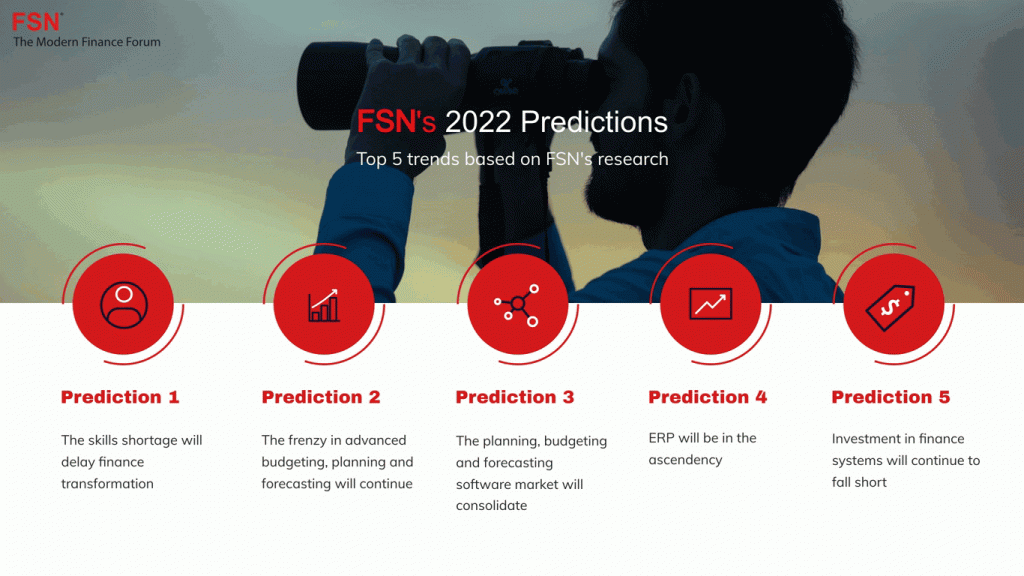FSN’s top 5 predictions for 2022 based on research findings from the Modern Finance Forum on LinkedIn

FSN’s top 5 predictions
1 The skills shortage will delay finance transformation
2 The frenzy in advanced budgeting, planning and forecasting will continue
3 The planning, budgeting and forecasting software market will consolidate
4 ERP will be in the ascendency
5 Investment in finance systems will continue to fall short
1 The skills shortage will delay finance transformation
The profound skills shortage, a project backlog caused by Covid and a lack of time has created a ‘perfect storm’ which will prevent many finance functions carrying out improvement initiatives in 2022. FSN’s research shows that finance headcount has not increased over the last three years, with a little scope to add new resources. Added to which the pressure of economic uncertainty and preparations for new regulatory requirements, such as ESG are stretching finance functions to the limit.
It all means that finance functions must be very selective about what they do, and when they do it. As a result, wholesale process change and transformation is even more unlikely to get the green light.
2 The frenzy in budgeting, planning and forecasting will continue
The fallout from Covid highlighted the tremendous need for faster and more accurate forecasting processes that would also allow organisations to look out further into the future. The circumstances are less dire than they were two years ago, but there is still a pressing need to introduce more dependable automation. Once again, FSN’s research highlights this as the priority area, particularly in relation to scenario planning.
3 The planning, budgeting, and forecasting software market will consolidate
The clamour for new planning, budgeting and forecasting systems highlighted in 2 above, has attracted a lot of new software vendors who see it as a rich seam of opportunity. The injection of new and innovative solutions is of course welcome, but it means that there are too many software houses chasing too few customers. This will inevitably lead to fall out, and organisations will need to be especially careful in the current circumstances to ensure that software vendors are profitable and have a solid and established user base. Reference site visits and contract negotiations will assume even greater importance in 2022
4 ERP will be in the ascendency
Data quality remains the pre-eminent concern for almost every finance function. Less than 20% claim “data mastery” and under 10% have fully transformed key financial processes, such as R2R and FP&A.
ERP remains the most dependable and trustworthy source of data, and those organisations that have standardised around a single ERP instance, will seek to leverage the capabilities of their ERP systems more fully, rather than adopt separate best of breed solutions.
Some ERP vendors are enhancing their capabilities by joining forces with specialised planning, budgeting and forecasting vendors to become more of a ‘one-stop-shop’. We expect this trend to continue.
Around 60% to 70% of finance functions are strongly placed to take advantage of these developments and we consider this will become more attractive set against the backcloth of personnel, economic and time constraints.
Investment in finance systems will continue to fall short
According to FSN’s research, investment in customer facing systems has outweighed investment in back-office finance systems by as much as 4 to 1 over the last few years, and although there is an urgent need to redress the balance, finance functions find it surprisingly difficult to make a compelling business case to the rest of the C-suite. The situation is not helped by the fact that finance professionals always get the job done!
But the pendulum has swung too far in favour of customer-facing systems and there is a material risk that ageing finance systems will act as a brake on organisational agility and competitiveness. Put bluntly, there is no point having a wonderful customer experience, if, for example, invoicing errors and stockouts lead to disappointment. However, there is no sign that finance functions are managing to turn the situation around.
